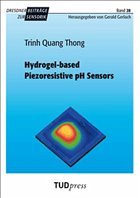Silicon piezoresistive sensors have a history of more than 50 years. They have a number of superior attributes such as inexpensiveness due to batch-production, small size, high sensitivity, and mechanical stability. Piezoresistive sensors are usually used to measure pressure and force. Their applications can be found in many fields such as automotive industry, microphones, humidity measurement, household electronics, and biomedical instruments (e.g., blood and fluid pressure sensors).
In this volume of the book series "Dresden Contributions to Sensor Technology" another application of piezoresistive sensors of usage for pH measurement has been investigated. For this purpose, the pH-dependent behaviour of appropriate polymer hydrogels - here in this work poly(vinyl alcohol)/poly(acrylic acid) - PVA/PAA - has been used to deflect the silicon bending plate in accordance to the pH value of surrounding aqueous solution. In the text, the investigations of the mechanical properties of PVA/PAA hydrogel, the sensor modeling and simulation, the sensor design and fabrication are presented and discussed. The sensor characteristics were experimentally evaluated and compared with those obtained by simulation.
In this volume of the book series "Dresden Contributions to Sensor Technology" another application of piezoresistive sensors of usage for pH measurement has been investigated. For this purpose, the pH-dependent behaviour of appropriate polymer hydrogels - here in this work poly(vinyl alcohol)/poly(acrylic acid) - PVA/PAA - has been used to deflect the silicon bending plate in accordance to the pH value of surrounding aqueous solution. In the text, the investigations of the mechanical properties of PVA/PAA hydrogel, the sensor modeling and simulation, the sensor design and fabrication are presented and discussed. The sensor characteristics were experimentally evaluated and compared with those obtained by simulation.

